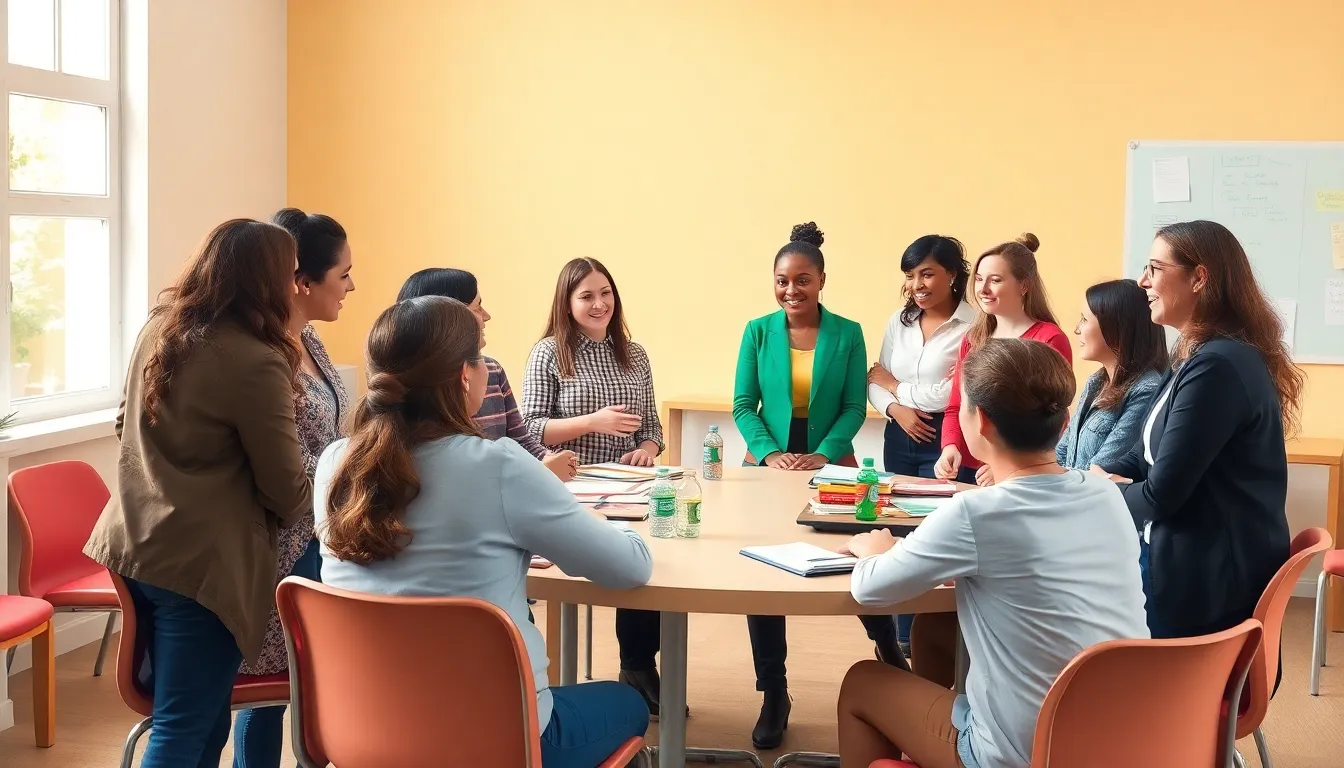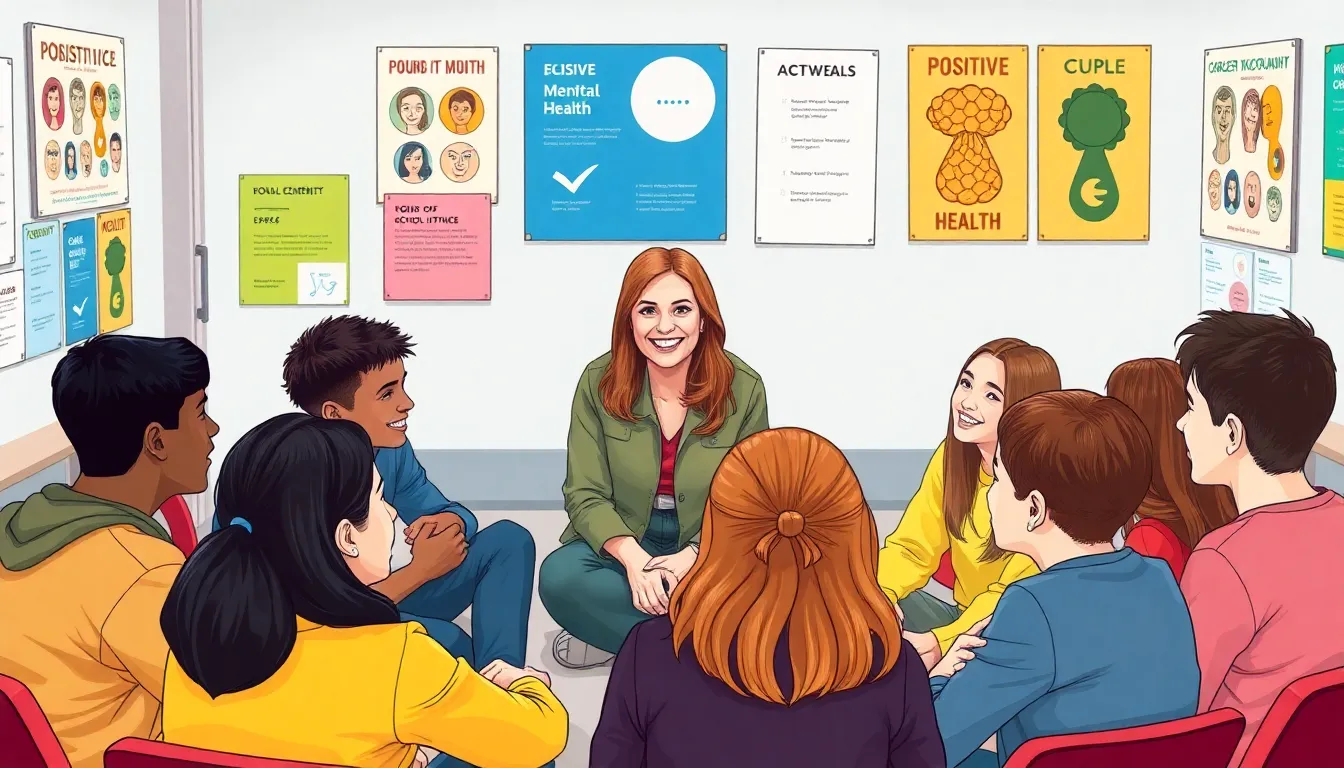In today’s fast-paced world, school counseling workshops have become the secret sauce for student success. Imagine a place where students can unload their worries, discover their passions, and maybe even learn how to juggle their homework like a pro. These workshops aren’t just about guidance; they’re a fun mix of learning and laughter that makes personal development feel less like a chore and more like a party.
Table of Contents
ToggleOverview of School Counseling Workshops
School counseling workshops play a crucial role in fostering student growth and well-being. These workshops create a structured environment for students to address personal challenges and cultivate essential life skills.
Definition and Purpose
School counseling workshops are organized sessions designed to support students’ emotional and social development. They address various topics, such as coping strategies, communication skills, and stress management techniques. Participating in these workshops benefits students by enhancing their self-awareness and resilience. Workshops also encourage students to explore their interests and goals in a supportive atmosphere. When students engage in activities and discussions, they connect with peers and learn from each other, reinforcing a sense of community.
Target Audience
The primary audience for school counseling workshops includes students from elementary through high school. Each age group faces unique challenges, making the programs adaptable to their specific needs. Counselors often tailor workshops for different grade levels, ensuring relevance and effectiveness. Parents also play a role by encouraging their children to participate in these workshops. Educators and school staff benefit from workshops as well, gaining insights into supporting their students’ needs. Community members may contribute by sharing resources or expertise, fostering a holistic approach to student development.
Benefits of School Counseling Workshops

School counseling workshops offer a multitude of advantages for both students and counselors. Positive outcomes stem from the collaborative nature of these sessions, significantly enhancing educational experiences.
Skill Development for Counselors
Counselors enhance their skills during workshops, gaining new techniques for effective student engagement. Networking opportunities arise, allowing them to share best practices and learn from peers. Training modules often include roles in crisis intervention, group facilitation, and mental health awareness. Individual growth occurs through workshops that encourage self-reflection and professional development. Increased competence leads to better support for students navigating their educational and emotional challenges.
Impact on Student Wellbeing
Students experience marked improvements in their well-being through participation in these workshops. Emotional intelligence develops as participants learn to express feelings and manage stress. Coping skills foster resilience, enabling individuals to face life’s challenges more effectively. Social connections strengthen when students collaborate in group settings, cultivating a supportive community. Academic performance also benefits since improved emotional health often correlates with greater focus and motivation in school.
Types of School Counseling Workshops
School counseling workshops come in various formats, catering to different needs and preferences.
Workshop Formats
Group sessions often provide a collaborative environment, allowing students to learn from one another’s experiences. Smaller workshops emphasize personalized attention, enhancing engagement through focused discussions. Online workshops make participation accessible regardless of location, promoting convenience for students with busy schedules. Evening or weekend sessions accommodate families by fitting into their routines. Each format ensures that students receive guidance in a manner that resonates with them.
Topics Covered
A variety of topics are covered in school counseling workshops, addressing essential skills for student development. Coping strategies equip students with techniques for managing stress effectively. Communication skills workshops teach the art of expressing thoughts and feelings constructively. Stress management sessions focus on practical methods to relieve pressure from academic and social demands. Additionally, workshops on emotional intelligence foster understanding of emotions and their impact on relationships. Each topic plays a crucial role in developing well-rounded, resilient students, enhancing their overall well-being.
Implementation Strategies
Effective implementation strategies ensure school counseling workshops meet students’ needs. These strategies focus on careful planning and engaging participants throughout the process.
Planning and Organization
Organizing a successful workshop begins with identifying specific goals tailored to each age group. Establishing a timeline for planning keeps the team on track. Gathering essential resources, such as materials and facilitators, enhances the overall experience. Involving parents and educators during the planning stage invites valuable insights and perspectives. Evaluating previous workshops can inform best practices, ensuring continuous improvement.
Engaging Participants
Creating an engaging atmosphere captures students’ attention and encourages participation. Interactive activities and discussions promote active involvement. Incorporating real-world scenarios makes topics relatable and applicable. Facilitators can use group work to foster collaboration among students. Encouraging open dialogue provides a safe space for expressing thoughts and feelings.
Case Studies and Success Stories
School counseling workshops demonstrate significant impact through real-world examples. These case studies highlight effective practices that yield impressive results.
Notable Workshops
One notable workshop focused on building emotional resilience among high school students. The session included mindfulness training and interactive activities, fostering deeper connections between participants. Another workshop aimed at elementary students used storytelling to teach coping strategies, making complex concepts relatable. These workshops not only engaged students but also encouraged positive peer interactions. The diverse formats of these workshops ensure wide-ranging approaches to student challenges. Successful implementations embrace creativity, enhancing participant involvement and retention.
Measurable Outcomes
Measurable outcomes from workshops validate their effectiveness. Surveys conducted post-sessions often show a 25% increase in students’ self-reported emotional well-being. Participants typically demonstrate improved coping skills, reflected in reduced anxiety and stress levels. Academic performance frequently improves as well, with students reporting enhanced focus and motivation. Workshops can also lead to a 30% rise in peer support connections. These outcomes emphasize the tangible benefits of structured counseling initiatives. Data collected highlights the workshops’ role in fostering a supportive school environment.
School counseling workshops are vital in shaping students’ emotional and social development. By providing a structured and supportive environment, these sessions empower students to tackle personal challenges and cultivate essential life skills. The collaborative nature of these workshops not only benefits students but also enhances counselors’ professional growth, creating a well-rounded support system.
With various formats tailored to meet the diverse needs of students, these workshops foster meaningful connections and promote resilience. The positive outcomes, backed by data and success stories, illustrate the profound impact of such initiatives on student well-being and academic performance. Embracing school counseling workshops paves the way for a brighter future for students, educators, and the entire school community.

